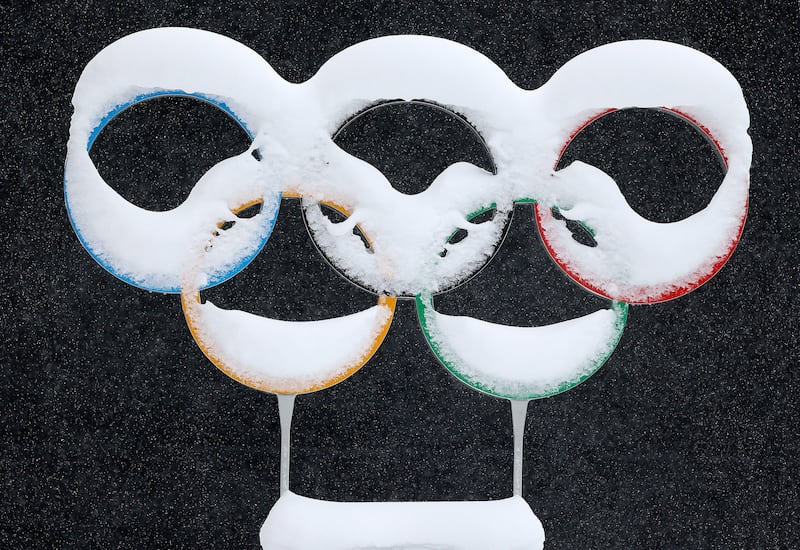Fraser Bullock now has plenty to report when it comes to snow during a planned update next week to the International Olympic Committee about Utah’s bid for the 2030 or 2034 Winter Games.
The massive winter storm that hit the state hard on Tuesday and continued Wednesday is good news for the bid, said Bullock, president and CEO of the Salt Lake City-Utah Committee for the Games.
“To be able to have an absolutely winter wonderland, phenomenal year of snow, it’s a very positive boost to our bid because it shows that Utah is a reliable winter host for Games,” he said, given the IOC’s new focus on the effects of climate change on the Winter Games.
It’s important enough that Bullock said he makes a point of beginning what are typically monthly conversations with IOC staff about the details of the bid with an update on snow conditions.
Last December, the IOC cited the need to look at climate change — including the possibility of rotating the Winter Games among a set group of cities with cold enough temperatures — as the reason for delaying a decision on a 2030 host, likely until some time next year.
A study of past Winter Games sites found four already have unreliable conditions for competition — Chamonix, France, which hosted in 1924; Sochi, Russia, in 2014; what’s now Palisades Tahoe in California, in 1960; and Garmisch-Partenkirchen, Germany, in 1936.
That study found that Salt Lake City, host of the 2002 Winter Games, can be counted on at least through 2050. The projections were different for the other cities bidding to host again in 2030 — Sapporo, Japan, and Vancouver, Canada.
By the end of the century, Sapporo, which held the 1972 Winter Games, is expected to be the only former host city that won’t be too warm in the winter for skiing and snowboarding events. Vancouver, a host in the 2010s, is seen as having unreliable conditions by 2080.
Bullock said bidders are working with climate experts at the University of Utah and an unnamed institution located outside the state to assemble data on what winters should look like beyond 2050.
He said Utah won’t have any trouble meeting the IOC’s proposed requirement that average minimum temperatures over a 10-year period fall below freezing at skiing and snowboarding venues for at least 10 days in February.
“We’re substantially below freezing for many of the days in February, so even with the rise in climate temperatures we have a big buffer to meet that requirement,” Bullock said, cold enough to make snow if Mother Nature doesn’t deliver the white stuff.
The latest storm shows Utah is in good shape climate-wise not only for holding an Olympics in 2030 or 2034, he said, but also for “the long-term prospect of hosting Games potentially on a rotating basis in the future.”
Salt Lake City made the Associated Press’ “highly theoretical list” of possible permanent Winter Games hosts, along with Vancouver in North America; Pyeongchang, South Korea, in Asia; and Switzerland, Italy and Scandinavia in Europe.
Retired Olympic skiing champion Lindsey Vonn, who’s part of Utah’s bid team, told the AP talks are underway about rotating the Winter Games because it’s “a challenge with climate change and also infrastructure to be able to find venues for the Winter Olympics.”
She said an “option is on the table in which certain altitude standards would be in place and it would have to have mostly pre-existing structures and it would limit the cost for the venues and it would limit the chances of climate change affecting the competitions in a negative way.”
Vonn said it’s not clear how soon a rotation system could be put in place.
“I know that’s been discussed,” she told the AP. “How early that will happen, I don’t know, but I don’t think it would happen before 2034.”
IOC President Thomas Bach said last December that postponing a decision on 2030 means the 2034 Winter Games will likely be awarded at the same time. The delay has also opened the door to new bids for 2030, including possibly one from Sweden.
Toronto-based GamesBids.com producer Robert Livingstone said when it comes to climate change, Salt Lake City may have “an advantage over anywhere else.” He said in Vancouver, which had to ship in snow in 2010, there’s concern over rising temperatures.
“If you’re looking at that long term, especially that permanent rotation if that comes to fruition, I think Salt Lake City probably has a leg up there,” Livingstone said. “Maybe this most recent storm will provide some further evidence to that.”
Bullock, who was skipping “a fantastic powder day” on the ski slopes Wednesday to work on bid details like determining how much to budget for temporary tents and trailers at venue sites, offered his sympathies to places that are having a tough snow year.
“We have them ourselves from time to time,” he said. “We are just basking this year in a great snow year and recognize that there’s always variability to it. But we’ll just enjoy this one with a big smile on our face.”


